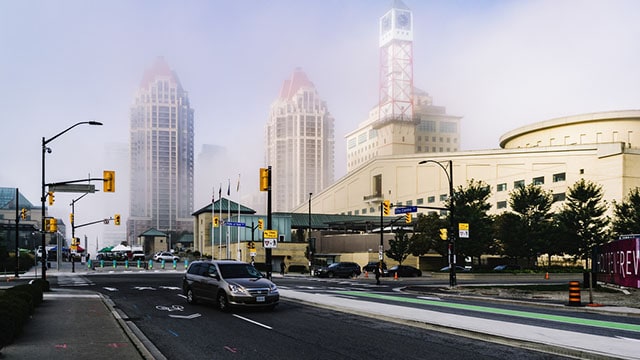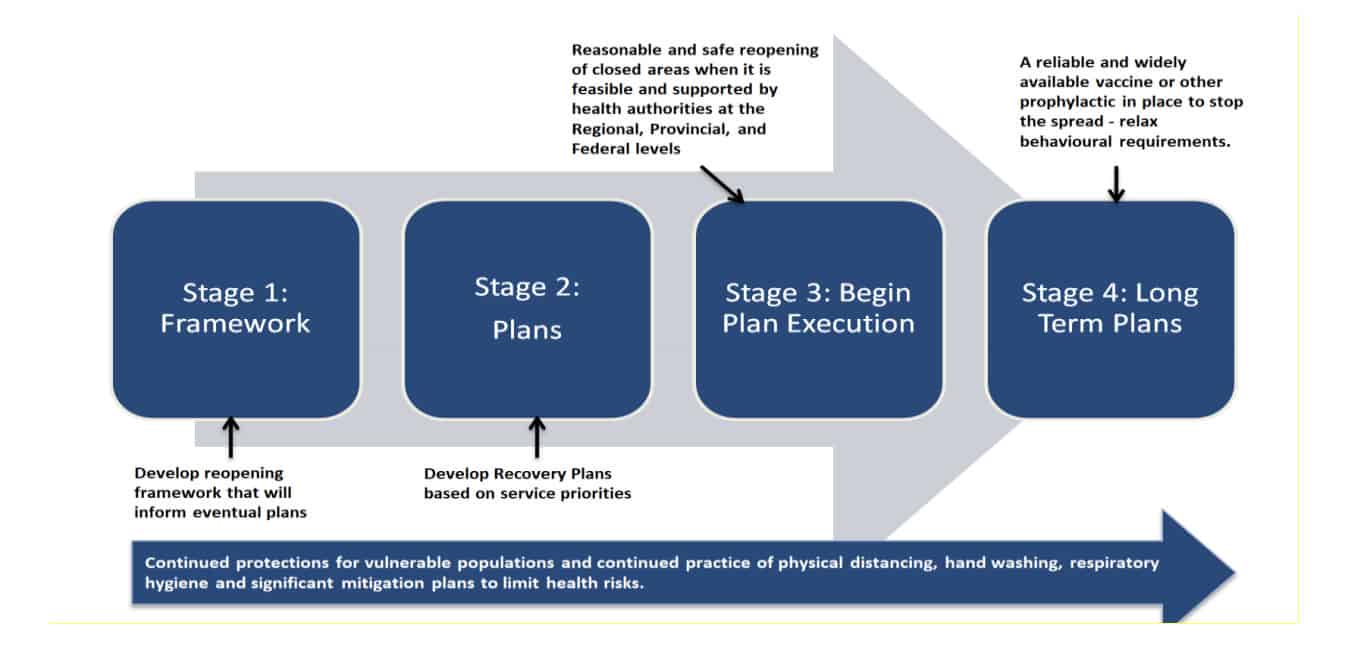Mississauga releases framework for reopening the city
Published May 13, 2020 at 8:13 pm

At a May 13 meeting, Mississauga city council was presented with a framework that it will refer to over the course of its gradual reopening process.
Emphasizing that the COVID-19 Recovery Framework is not a calendar (as no specific dates are provided), Paul Mitcham, Commissioner of Community Services (and future CAO and city manager), said the document provides guidelines for staff to work with while developing the recovery plan.
“This framework will help us navigate how Mississauga moves forward and recovers from the impacts of COVID-19,” said Mayor Bonnie Crombie in a statement.
“This plan incorporates what we have heard from stakeholders across our city and formalizes our path forward in a way that is safe, efficient and inclusive. The health and safety of employees and the public remain our top priority, and we will continue to take our lead from Peel Public Health as we implement our plans. While his pandemic has shaken us, it has not broken our spirit. Mississauga is determined, strong, and resilient. We will emerge from this stronger than ever before. Our goal is to get this right the first time.”
The city worked closely with Peel Public Health to develop the framework, which was developed based on best practices in other jurisdictions.
According to the framework, all recovery actions in the city will incorporate the following principles: Protecting the health and safety of the public and employees; using a phased approach; providing mental wellness and psychosocial support; “building back better;” and a whole community approach.
For the first principle, the framework says best practices and safeguards will be considered as the recovery and re-opening of facilities, services and programs take place. These plans will consider the use of personal protective equipment, utilization of physical distancing strategies and sanitation and cleaning protocols.
As for the second principle, the framework says the recovery will be implemented in incremental phases and that city’s approach will align with recommendations from the appropriate authorities.
On mental wellness and psychosocial support, the framework says recovery activities must consider the mental well-being of city employees, community partners and residents. The framework says “open spaces and connected places” will help in setting the stage for healthy living and supporting the positive mental health and wellness of our community.
On “Building Back Better,” the framework says recovery actions must ensure the city is able to thrive well into the future.
“Societal, organizational, and individual behaviors may be temporarily or permanently changed as a result of the COVID-19 pandemic. This may require the city to permanently modify the way it operates, or implement interim solutions,” the document says.
“The recovery period provides the city with an opportunity to identify and implement improved changes. This period also provides the city with an opportunity to identify lessons learned, and increase resiliency to other disruptive events in the future.”
On the “Whole Community Approach,” principle, the document says recovery will require the participation and collaboration of both internal and external stakeholders, including residents, businesses, and community organizations.
Recovery activities in Mississauga will be coordinated with surrounding municipalities, where possible, to align with recovery actions throughout the Greater Toronto Area and Ontario.
The document says that despite this alignment of activities, there is no ‘one size fits all’ approach to recovery and that Mississauga needs a recovery plan tailored to its unique needs.
The framework also identifies four pillars of recovery: Community, Economic, Finance, and Corporate.
The entire recovery roadmap contains four stages: the framework, plans, plan execution, and long-term plans.

The document also says recovery actions will require and consist of: Compliance, surveillance, the appropriate pace of implementation, risk assessments, a hierarchy of controls, sanitation and hygiene, and communications.
“Work is underway and staff teams are already engaged in recovery planning to ensure the city is prepared to restore services and respond to community needs as we move beyond the initial crisis stages,” said Mitcham in a statement.
“Moving from the framework, the city will put the focus on developing plans based on service priorities, following federal and provincial guidelines, consulting with community groups and other key community stakeholders and exploring options for financial restoration in consultation with council. There will be lasting financial impacts to the city and the overall economy from this crisis. Developing a strong financial plan to mitigate these impacts is a pillar of the COVID-19 Recovery Framework. Council will be kept apprised of financial impacts throughout the pandemic and recovery phases.”
As for how the framework aligns with the aforementioned pillars, the framework breaks its approach into the following categories:
Move: The city will maintain and regulate a robust transportation network with a key focus on the recovery of public transit and the role of active transportation (such as bike lanes or areas suitable for cyclists and pedestrians).
Belong: The city will reopen public facilities and re-engage residents in events, programs and services in a safe and responsible manner.
Connect: Development will continue in a safe and regulated fashion when controls on construction and other projects are eased.
Prosper: The city will facilitate economic prosperity by identifying and creating existing or revitalized opportunities for economic contribution from city residents and businesses.
Green: Recovery will include a continued focus on achieving the city’s climate change goals and promoting environmentally-friendly operating practices.
Moving forward, the city will focus on: Developing detailed plans based on the approved framework and service priorities supported by federal and provincial guidelines; consulting with community groups and other key community stakeholders; exploring options for financial restoration in consultation with council, and developing a strong communication plan to reach all stakeholders.
As far as financial recovery is concerned, the framework says public health considerations must remain paramount at all times.
Beyond that, the framework says recovery is contingent upon preserving the long term strength of the property tax base, adding that taxes provide 58 per cent of the revenues that fund city services.
The framework suggests that taxpayers will have to pay for some COVID-19 shortfalls in the future.
“Any loss in taxes in response to the COVID-19 crisis will require a reduction in services or a disproportionate increase in taxes in the future,” the document says.
“Tax deferrals provide short-term relief to taxpayers while ensuring sufficient funding to maintain services. Cancellation of fees is a cost that will need to be borne by the taxpayers
in another way in a later year. Staff are assessing approved and forecasted resources and will report to council on an urgent basis with recommendations to assist the financial challenge as we look to the provincial and federal governments for assistance.”
To aid in the city’s financial recovery, the document says deviation from Mississauga’s financial plan should not be permanent
“Any assistance to the public and businesses should be one time or have a defined end date if they are approved by council,” the document reads.
The framework also addresses the need for higher levels of government to step in to assist municipalities.
“The [city] will run a significant deficit in 2020 and it is unclear what, if any, assistance will be provided by higher levels of government. Council has several master plans and strategies in place, based on public engagement.”
The framework says the approved budget for 2020 will be assessed and the 2021 budget used as an opportunity for engagement and “resetting” to meet the financial capacity of the city.
As far as city services are concerned, the recovery will include the restoration of the municipality
to full productivity. City business units and facilities that have closed will be opened based on priorities of service and following the direction and guidance from public health and provincial governments.
“The [city] will consider the abilities to alter the way we work and operate to determine how and who we bring back to the physical workplace,” the framework says.
“The city will take an excess of care in repopulating office and public environments.”
To read the full plan, click here.
Cover photo courtesy of @idris.yyz
INsauga's Editorial Standards and Policies


